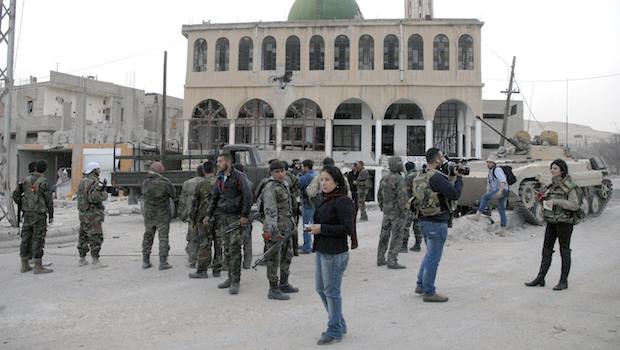
Soldiers loyal to Syria’s President Bashar Al-Assad stand with members of the media at Al-Sahl after the soldiers seize control from rebel fighters in this March 3, 2014, handout photograph distributed by Syria’s national news agency, SANA. (REUTERS/SANA/Handout via Reuters)
Beirut and London, Asharq Al-Awsat—Syrian government forces have intensified their attacks on the town of Yabroud, one of the most important remaining opposition strongholds in the mountainous Qalamoun area along the Lebanese border.
The UK-based Syrian Observatory for Human Rights said on Tuesday that government forces attacked Yabroud with helicopter-borne barrel bombs, and that “these attacks come one day after the killing 15 opposition fighters in clashes near the town of Sehel.” The Observatory also quoted opposition activists as saying that fighting was continuing in the Sehel area, north of Yabroud.
Lebanese Al-Manar TV, which is operated by the Hezbollah movement, aired on Monday a video of government soldiers who had reportedly stormed Sehel and expelled armed groups.
The same day, a Syrian army officer was quoted by the news agency AFP as saying: “We noted a state of confusion and defeat among the armed groups” and that “Al-Sahl is very important because it is the first line of defense for the town of Yabroud.”
The battle of Qalamoun started at the end of 2013, when the Syrian army advanced on a number of towns and expelled armed rebel groups, resulting in the displacement of many residents of the area to nearby Lebanon.
The region is strategically situated, falling between Damascus and Homs, and is a key supply route for government forces, as well as linking rebel groups in the Rif Dimashq area around the capitol with sympathizers in Lebanon.
Hezbollah has also accused armed groups based in Yabroud of preparing car bombs for attacks on areas linked to its supporters in Lebanon.
Elsewhere in Syria, the Islamic State of Iraq and Syria (ISIS) said its fighters had entered the Yarmouk Palestinian refugee camp in southern Damascus.
In a statement published on their Twitter account, ISIS said that “ISIS fighters, along with fighting factions in Yarmouk, have succeeded expelling the ‘Shabihas of Ahmad Jibril,’” a reference to the fighters of the Popular Front for the Liberation of Palestine-General Command (PFLP-GC), which is reportedly allied with the Syrian government.
The director of the Syrian Observatory for Human Rights, Rami Abdurrahman, told Asharq Al-Awsat that despite the fact that ISIS entered Yarmouk camp, the Al-Nusra Front remains the most organized jihadist force inside the camp.
Abdurrahman said the decision by ISIS to enter the Yarmouk camp may have been triggered on Monday by Syrian government threats to storm the camp if it was not cleared of Islamist fighters.
Abdurrahman said: “The situation on the ground in the camp on Tuesday was calm” but that he expected “an escalation in the coming hours.”
The Al-Nusra Front deployed in the camp two days ago, accusing the government of violating a truce signed in mid-January, and has allowed aid to reach the residents.
Opposition activists blame ISIS for the breakdown of the truce when the group’s fighters stormed the town of Bebella, where the truce was signed, and raised its flag over the municipal building.
Meanwhile, activists said Syrian government forces had used heavy artillery to bombard a group of Syrian refugees who gathered in a mosque and some houses in the town of Holah, in Rif Homs. The activists added that the town was suffering from difficult humanitarian conditions because of the constant bombardment and the government forces’ control of the roads leading to the town.
In Deir Ezzor, government forces made progress in fighting around the town’s military airport with help from the Iraqi Abu Al-Fadl Al-Abbas Brigade, according to Bashar Al-Abbad, spokesman of the rebel factions besieging the airbase.
Abbad said: “Opposition forces intercepted a wireless communication between Iraqi military elements in the airport area, which proves their participation in the fighting with the regime.”
